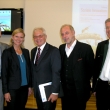M.A. in Social Innovation
17. Okt 2012
The EU Representation of the European Parliament (EP) and of the European Commission (EC) in Austria hosted an event on "Social Innovation - Prospects in Europe" (Oct. 15, 2012), including the public presentation of the Master of Arts in Social Innovation, starting in the academic year 2012/2013.
In discussion with Heinz K. Becker, Member of EP, Isabella Eiselt from the Austrian Ministry of Science and Research (BMWF) and Peter Baumgartner (DUK) I had the opportunity to explain the concept of social innovation as well as the basics of the study programme. The debate was held in English, as this is the working language of the M.A. studies, yet also to be recorded and used in a video for international follow-up information and promotion.
The panel debate provided an excellent stage to highlight the pioneering role of Austria among the recently rising tide of interest and activities unfolding under the - still kind of fuzzy - label of social innovation:
- The Centre for Social Innovation (ZSI) was founded more than 20 years ago, way ahead of the many organisations now working under this meanwhile prestigious name in actually all world regions.
- Similarly, the Austrian Award for Social Innovation ("SozialMarie") stands out as a major signpost and earliest European prize recognising achievements in social innovation. Most recently a European Social Innovation Competition was launched on Oct. 1st, 2012, to stimulate working towards social innovation.
- Again at the forefront of international developments, the M.A. in Social Innovation at DUK is the first course of studies leading to an academic degree in the field world-wide. At ZSI we are very happy and grateful to Danube University to render possible this great achievement collaboratively!
Why an academic course of studies?
It is the paramount importance attributed to social innovations that necessitates professional education and training on scientific level. Until now the concept itself seems unclear, even to many of the active players in the area; there are inconsistent theoretical foundations, missing indicators and insufficient methodologies to measure success and impact of social innovations. Graduates of studies in social innovation will become equipped with the most recent qualifications in scientific theories, methods and research conscerning social innovation, seen as an integral part of an extended and comprehensive paradigm of innovation.
Yet beyond scientific knowledge graduates of this Master's programme will acquire know-how and skills for career opportunities as social innovators themselves, or as certified managers of social innovation processes. The curriculum focuses on social innovations in major praxis and policy areas such as employment, environment, communication, ageing, health and social services.
As a result the professional profile of graduates will include the following core competencies:
- Project and programme assessment concerning social innovation procedures, e.g. working as evaluator or consultant
- Guidance on social innovation development and implementation in enterprises, public institutions or civil society organisations
- Research concerning social innovation needs, requirements, conditions and impact
- Provision of education and training supportive to social entrepreneurship
Most of social innovations develop - as innovations in general do - incrementally, quite often improving step-by-step the quality of life of specific groups in need, and not for the whole of society. Yet there are as well urgent demands for game-changing "systemic innovations" (cf. BEPA-Report), aiming at life-styles and modes of production and consumption positioning the world society of the 21st century to adapt to climate change and other critical challenges. "Certified Social Innovators" graduating from DUK will be capable to work in such varied fields of interest and range in society, facilitating appropriate social innovations in many sectors and to address different levels of complexity.
The panel debate demonstrated the timelyness of such studies. Heinz K. Becker, MEP, outlined a number of policy decisions regarding the further advancement of social innovation in Europe, in particular the forthcoming establishment of a "Social Investment Fund" based on co-decision between EC and EP, in line with the Programme for Social Change and Innovation. Isabella Eiselt (BMWF) refered to the many research topics touching issues of social innovation in the current Call for Proposals of 7th Framework Programme on RTDI, the relevance paid to social innovation in the Europe 2020 strategy and in Horizon 2020. Peter Baumgartner (DUK) made clear, how well the concept of social innovation and the study programme suits the profile of his Department and the cornerstones of the Danube University, as these are post graduate skills provision to professionals (mainly in mid-career positions), life-long learning and applying innovation to teaching, learning and research practices.
Verwandte Artikel:
- Projekt: Soziale Innovation in KMU - SInn
Tags: education, social innovation
















































